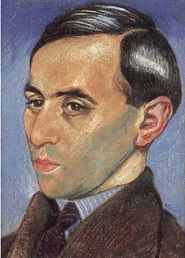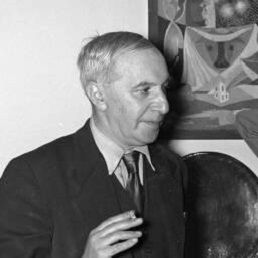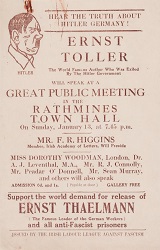Life
| 1896-1979 [Abraham Jacob Leventhal; fam. ‘Con’; pseud. “Lawrence K. Emery”] b. 9 May 1896, Lwr. Clanbrassil St., Dublin; his mother [Rosa née Luxemburg] was a mbr. of the Women’s Zionist Society and a poet; ed. Wesley College, and TCD (Mod. Lang. 1st Class); ed. TCD Miscellany in 1918; interviewed Joyce in Paris on the day of the publication of Ulysses; joined with the Zionist [Sionist] Commission and worked in Palestine for a year while still a student, helping to found Palestine Weekly; joined the London office of Jewish National Fund and worked with the Zionist Review]; visited Joyce in Paris, 1921; m. Gertrude Zlotover, 1922 (with whom a dg.); ran the Irish Book Shop on Dawson St.; completed a PhD in contemporary French literature (TCD) and appt. to French Dept., 1932 [replacing Beckett]; m. Gertrude Zlotover, Oct. 1922 and worked briefly in her father’s furniture business; started the Irish Bookshop on Dawson St.; |
| asst. ed. Hermethena; wrote a review of Ulysses for the Dublin Magazine (ed. Seumas O’Sullivan [nom de plume of James Sullivan Starkey]) which was rejected by the printer Dollard during proofing; brought it out in truncated under the pseudonym “Lawrence K. Emery” in Klaxon (1923) which he founded with Francis Stuart and Cecil ffrench Saleld, running to one issue only; also contains Arland Ussher’s trans. of Merriman’s Midnight Court, and a short piece by F. R. Higgins; editorial incl. expressed desire for ‘a whiff of Dadaist Europe to kick Ireland in to wakefulness’; Levental contrib. a review of Liam O’Flaherty’s The Black Soul to Francis Stuart’s To-morrow (Aug.-Sept. 1924) - where Yeats’s “Leda and the Swan” appeared - and is regarded as a co-founder of that short-lived journal; listed as a participant in an anti-Hitler rally in Rathmines Town Hall organised by the Labour League Against Fascism with Peadar O’Donnell and F. R. Higgins (IAL) presiding, to be addressed by Ernst Toller on Sun. 13 Jan. 1935 but afterwards cancelled when the Irish Govt. refused Toller entry on account of supposed Communist support; |
| embarked on life-long relationship with Ethna MacCarthy [see note], who received love-letters from Beckett at Ussy-sur-Marne; he succeeded Beckett in a French lectureship at TCD in 1932 [DIB 1931]; contrib. “Dramatic Commentary” to Dublin Magazine (Oct-Dec. 1943), and for 15 years thereafter, ending in April-June 1958 with the death of Starkey; contrib. “What it means to be a Jew”, in The Bell (1945); reviewed Beckett’s Godot for Dublin Magazine, 1953; supported the traditional agenda of the RHA on the exclusion of Louis le Brocquy and Mainie Jellett, 1943; reputedly parted with Beckett when he commenced a sexual relationship with Ethna, whom he married after Gertrude’s death, 1956 - when Beckett reconciled with him; suffered the death of Ethna, 24 May, 1959; met and married Marion Leigh, who was reputedly a part-model for Molly Bloom, 1961, living in Paris; retired from Trinity, 1963, and was the object of a parting dinner at Jammet’s; settled in Paris that year, where he acted as Beckett’s assistant; |
|
played in the Dublin Drama League and appeared in a piece by Denis Johnston; Leventhal lived at Oakfield Place, Portobello, Dublin; d. Paris; a small festschrift publication was edited by Eoin O’Brien issued to inaugurate a memorial scholarship to Paris in 1984 (Dublin)) which contains a eulogy by Niall Montgomery, with portraits and a bibliography; Leventhal appeared unwittingly as Bloom in John Ryan’s Bloomsday film of 1954, with Brian O’Nolan (Flann O’Brien), Patrick Kavanagh, and Anthony Cronin; there is a portrait by Cecil ffrench Salkeld (1924). DIB |
|
||||||
[ Click these images to view in separate windows ]
[ top ]
Works| Selected |
|
| Bibliography |
|
|
| Papers of A.J. (“Con”] Levental Archival holdings |
|
The Klaxon ([Dublin: [1924]), 26, [2]pp., ill. [pl.], 26cm. - styled quarterly[ref. OLS JOH 138 No.13 [in Early Printed [i.e. rare] Books collection. Note: the said plate faces the the editorial (p.1.), and shows a ‘Negro Sculpture in Wood’ [female], ‘kindly lent by Grace Henry’. |
| Harry Ransom Center (Austin U, Texas) |
|
[A copy of Klaxon from the library of Sybil Le Brocquy is held by Bruce Stewart (Ricorso ed.) - see extracts under Quotations, infra.] |
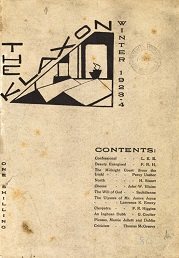 |
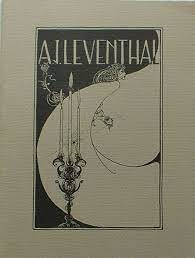 |
| Klaxon (1923) | A.J. Leventhal |
[ Click these images to view in separate windows ]
[ top ]
Criticism
|
|
Note: Leventhal’s desire for a ‘whiff of Dadaist Europe’ is cited in Nicholas Allen, Modernism, Ireland and Civil War (Cambridge UP 2009), p.90.
[ top].
Commentary
Brian Kennedy, Irish Art & Modernism (1991), notes that Leventhal sided with the Royal Hibernian Academy [RHA] in its 1943 rejection of Mainie Jellett and Louis le Brocquy (leading to the foundation of the Living Art). ‘Reviewing the exhibition in Dublin Magazine, he reminded us that that it should promise no shocks against the established order ‘since its hierarchy is based on the ruling art dogma’; thus he says the RHA offers “the best the country can produce in the traditional mode” and concludes that the 1943 show was one of the most interesting in the history of the Academy.’ Dublin Magazine (July-Sept. 1943), pp.69-70. Leventhal found Mainie [sic] Jellett’s approach to Cubism a little outmoded (op. cit.)
| Eoin O’Brien, A.J. Leventhal 1896-1979: Dublin Scholar, Wit and Man of Letters (Dublin: Glendale Press 1984), pp.19-20: |
|
| —A.J. Leventhal 1896-1979: Dublin Scholar, wit and man of letters, ed. by Eoin O’Brien. Leventhal Scholarship Committee (Dublin: Glendale Press 1984), [5]-31pp. [available as pdf - online; accessed 07.09.2010; 08.05.2022].) |
[ top ]
References
Donagh MacDonagh, ed., Poems from Ireland (Dublin The Irish Times 1944), notes that he has been schoolteacher and Fleet St. journalist, has edited Zionist Review and acted with the Abbey Theatre Company; lectures in French and English at the Univ. of Dublin [TCD]; is dramatic critic to the Dublin Magazine and asst. ed. of Hermethena.
Henry Boylan, A Dictionary of Irish Biography [rev. edn.] (Gill & Macmillan 1988) notes that a perceptive review of Ulysses written for Dublin Magazine in 1923 was rejected by printer and brought out in his one-issue Klaxon; published To-Morrow [err.]; asst. ed., Hermathena, broadcaster on RE and BBC; contrib. to International Herald Tribune and Financial Times from Paris after retirement; friend of Beckett.
[Click image to enlarge]
"Ernst Toller in Dublin?: The advertised Anti-Fascist meeting to be addressed by Ernst Toller advocating the release of a German Communist labour-leader Ernst Thalmann imprisoned under Hitler was cancelled when Toller was refused the right to enter Ireland by De Valera’s government at the behest of the German Embassy. Richard Dove writes: ‘[In Jan. 1935, Toller] was invited to address a rally of the Irish Labour League against Fascism on ‘National Socialist Germany’ but was refused permission to enter Ireland following representations by the German Embassy in Dublin.’ (‘The British Connection: Aspects of The Biography of Ernst Toller’, in German Life and Letters, 40, 4 July 1987) [see online]. See also Joachim Fischer, ‘Ernst Toller and Ireland’ in German Writers and Politics 1918-39 (1992) - quoting a minutes of Toller’s meeting with John Dulanty, the Irish High Commissioner, in London, when Toller showed himself unaware of the communist composition of the Dublin committee and unwilling to jeopardise his campaign for the release of German pacifists by opening associating with them: ’Mr. Toller himself was keen on avoiding any public discussion on Communism he would be well advised not to give the proposed lecture. Mr. Toller agreed’ the minutes state. They finally agree on a press statement which says no more than that Toller ‘is advised by a responsible quarter’ not to go to Dublin.” Fischer continues: “In Dublin, however, it looked very much like a ban”, as “the German Legation in Dublin had made representations to the Irish government”, and that “informed circles” knew that Toller’s potential appearance “threatened to endanger the success of ongoing trade talks between the Free State and the Reich”. Toller hanged himself in a New York hotel in May 1939, affected by the murder of relatives and others in Fascist Spain. (All cited by Citizen Partridge [blog] - online; accessed 08.05.2022].
See further: Maurice Casey draws attention to a ‘fascinating handbill’ of 1935 for a meeting in Dublin to be addressed by Ernst Toller citing as speakers Con Leventhal with others including Dorothy Woodman, a British journalist who had covered the Reichstag fire trial. (See Casey on Twitter - online.).
[ top ]
Quotations
Klaxon (1923) - Editorial: ‘We are the offspring of a gin and vermouth in a local public-house. We swore that we were young and could assert our youth with all its follies. We railed against the psychopedantic parlours of our elders and their maidenly consorts, hoping the while with an excess of Picabia and banter, a whiff of Dadaist Europe to kick Ireland into artistic wakefulness’. (Klaxon, p.1; quoted in Eoin O’Brien, ‘The Writings of A. J. Leventhal: A Bibliography’, in A. J. Leventhal 1896-1979: Dublin scholar, wit and man of letters, ed. O’Brien [Con Leventhal Scholarship Commitee] (Glendate Press, Glenageary 1984), p.19.
Further: ‘We proclaim that we can forgive the sinner, but abhor the atheist, and that we count among atheists had writers and Bishops of all denominations’. (Tomorrow [editorial]; quoted in O’Brien, op. cit., 1984, p.20.)
‘The Ulysses of Mr James Joyce’, in Klaxon (Winter 1923): Tthere is in all his work a cold objectivity. He has an uncanny keenness of perception which he does not let his ego influence. This perception he must have applied to himself, and he can synthesise a character from details observed in his own person.’ (p.14); ‘the variegated fabric of Ulysses’ (p.15); one might argue [...] that Ulysses [like the Bible] is the work of many hands, where it not for the fact that in the seeming medley of chapters and styles there is a form as rigid as that of a sonnet [...] the Homeric hero [...]. See further under James Joyce, Commentary [supra]; see also full text version in RICORSO Library, “Criticism > Major Authors / Joyce”, via index or direct.]
[ top ]
Notes
James Joyce inscribed Marion Levental on his ballad of Molly Bloom, written in 1923: ‘Man dear, did you never hear of buxom Molly Bloom at all / as plumb an Irish beauty, sir, as Annie Levy Blumenthal, / If she sat in the vice-regal box Tim Healy’d have no room at all / But curl up in a corner from a glance of her eye. [... &c.]’ (See Richard Ellmann, James Joyce, 1965 Edn., p.561.)
Note: Arland Ussher quotes Levanthal in calling Joyce’s story “Two Gallants” the ‘first study of a gigolo’ in The Dublin Magazine. (Ussher, Three Great Irishmen, London: Gollancz 1952, p.138.)
Jammet’s: the dinner held in honour of Con Leventhal when he retired from Trinity in 1963 was organised by Liam Ó Briain (UCG) and Hermann Good, with Austin Clarke, F. R. Rodgers and his dg. Harden Rodgers [later a TCD lecturer in English], Owen Sheehy-Skeffington, George Hetherington, and Micheál MacLiammóir as a late arrival - presum. after the theatre. (All according to Niall Montgomery, also present, in his eulogy of Leventhal, in Eoin O’Brien, ed., A. J. Leventhal 1896-1979: Dublin scholar, wit and man of letters [Con Leventhal Scholarship Commitee], Glendate Press, Glenageary 1984, pp.9-13; p.11 [see full copy - as attached].)
Ethna MacCarthy (1903-59); b. Coleraine, Co. Londonderry; gd-dg. of Denis Florence MacCarthy and dg. of a medical inspector; family moved to Dublin; attended RIAM before entering TCD on Foundation Schol. (French & Spanish; BA, 1926; MA 1937); figured as “the Alba” in the Beckett’s Dream of Fair to Middling Women and the also woman in Krapp’s Last Tape; grad. in Physics (TCD 1941) and afterwards in Medicine (TCD, 1946); worked as pediatrician at Royal City of Dublin Hospital up to 1954 when she sought to join the World Health Organisation [WHO] but was foiled by her medical report; lectured in Spanish at TCD - and was noted for her striking presence and freedom from convention; d. of throat cancer, 24 May 1959, East Ham Memorial Hospital, London. Her poems “Clinic”; “Lullaby”, and others were printed in Dublin Magazine in the 1940s; translations from Spanish and German appeared there and in Kottabistae (TCD); other writings incl. “The Uninvited” [one act play] (Dublin Magazine, 1951) and “Flight”, a short story, (Ireland To-day, 1937); some of her letters are incl. in the Denis Johnston collection (TCD) and the Beckett Papers (Univ. of Austin, Texas). [See entry on MacCarthy by J. B. Lyons in Dictionary of Irish Biography (RIA 2009) - available online.] Bibl., Poems of Etha MacCarthy, ed. Eoin O’Brien & Gerald Dawe (Dublin: Lilliput Press 2019), xxiv 95pp. ill. [port; incls. “The The Uninvited: A Poetic Drama”. See Eoin O’Brien, ‘ Ethna MacCarthy: resurrecting a lost poetic voice’ [sub-heading, [The doctor’s poems were discovered among the papers of her late husband Con Leventhal], in The Irish Times, 3 Oct. 2019 - online; accessed 08.05.2022.] |
|
[ top ]
